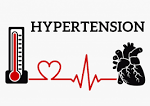Hypertension can be called high blood pressure. It usually leads to severe health complications and increases the risk of heart disease, stroke, and sometimes loss of life. Blood pressure is the force that individual blood exerts opposite the walls of the blood vessels. This pressure relies on the resistance of the blood vessels and how hard the heart has to act. Almost half of all adults in the world have high blood pressure or hypertension why many are not aware of this fact.
Hypertension is seen as a primary risk factor for cardiovascular disease, including stroke, heart attack, heart failure, and aneurysm. Keeping blood pressure or hypertension under control is essential for preserving health and reducing the risk of these dangerous conditions. To regulate or control this imped iment, the following guides need to be followed.

Stress reduction:- Learning to manage stress can assist a person to control blood pressure or hypertension. Meditation, warm baths, yoga, and simply going on long walks are relaxation methods which can help relieve stress. People should avoid taking alcohol, recreational drugs, tobacco, and junk food to manage stress, as these can contribute to elevated hypertension or blood pressure and the complications of hypertension. Smoking can also increase hypertension or blood pressure. Avoiding smoking reduces the risk of hypertension, serious heart conditions, and other health issues.
Medication:- People can also use specific medications to treat hypertension. Expertise will often recommend a low dose at first. Antihypertensive medications will only have minor side effects. Eventually, people with hypertension or high blood pressure will need to combine two or more drugs to manage their blood pressure. Medications for hypertension include the following; diuretics, including thiazides, chlorthalidone, and indapamide, beta-blockers and alpha-blockers, calcium-channel blockers, central agonists, peripheral adrenergic inhibitor, vasodilators, angiotensin-converting enzyme (ACE) inhibitors, angiotensin receptor blockers.

The choice of treatment depends on the individual and any underlying medical conditions they may experience, anyone on antihypertensive medications should carefully read the labels of any over-the-counter (OTC) drugs they may also take, such as decongestants. These OTC drugs can interact with the medications they are using to lower the blood pressure.
Excess body weight can also contribute to hypertension or high blood pressure. A fall in blood pressure does follow weight loss, as the heart does not have to work so hard to pump blood around the body. A balanced diet and a calorie intake that matches the individual’s size, sex, and activity level will help.
